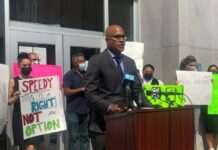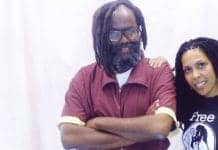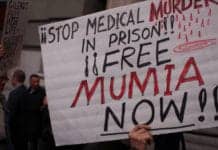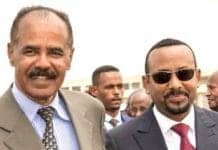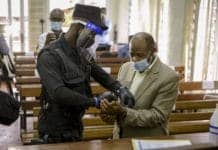To introduce Bay View readers to the volatile issues surrounding Rwanda’s August presidential election, here are a series of articles by Ann Garrison, the only U.S. journalist covering the issues, which were published on the dates shown in Digital Journal and other online news sites. The struggle for the leadership of Rwanda deeply affects the genocidal conflict in the neighboring Democratic Republic of Congo, where, in the past decade, more than 6 million Congolese have been killed.
by Ann Garrison

At 12:38 Greenwich Mean Time, on Feb. 20, the BBC reported “Rwandan capital Kigali hit by deadly grenade attacks.”
Several hours earlier, the Permanent Consultative Council of Opposition Parties in Rwanda issued this statement, signed by the leaders of all three broadbased opposition parties, about the attacks:
“Condemnation of grenade attacks in Kigali
“The Permanent Consultative Council of Opposition Parties in Rwanda, which brings together the following political organizations: The United Democratic Forces – Inkingi, The Democratic Green Party of Rwanda, Le Parti Social Imberakuri, has learned with shock and horror about the grenade blasts which occurred last night, 19th Feb 2010, almost simultaneously in three different localities in Kigali.

“We strongly condemn these barbaric acts in the strongest terms possible and call upon the Rwandan government, as we have done in the recent past to:
“1. Investigate and bring to book the perpetrators of these acts
“2. Ensure a fair hearing of the suspects once they are apprehended
“3. Guarantee security of persons and their property.
“Issued at Kigali, 20th February 2010.”

The state run Rwanda News Agency reported, also on Feb. 20, that Rwandan police are holding two men they believe to be responsible and that they already know, without further investigation, who is responsible – the Hutu paramilitary force known as the “interahamwe.”
Election Rwanda: Who will be allowed to run?
Feb. 17 – On Feb. 10, Human Rights Watch issued a news release, “Rwanda: End Attacks on Opposition Parties,” but the attacks haven’t ended. FDU-Inkingi candidate Victoire Ingabiré Umuhoza was facing another interrogation by the Criminal Investigation Division of the Rwandan Police at the time I recorded this for KPFA Radio News including some of my most recent conversations with her. She was once again released, though still unable to register the FDU-Inkingi Party.
On Feb. 18, Amnesty International joined Human Rights Watch by issuing a release titled “Intimidation of opposition parties must end.”
Meanwhile, Kigali’s Gasabo District has once again refused to give the Democratic Green Party of Rwanda a permit to hold the convention that it must hold to field a presidential candidate, because the police have not given them a “clearance,” even though nonviolence is one of the 10 key values of Green Parties worldwide.
Rwandan opposition threatened by ruling RPF
Feb. 9 – Victoire Ingabiré Umuhoza, Rwanda’s leading opposition presidential candidate, now believes that she could be arrested at any time. I spoke to Mrs. Ingabiré on the phone and created this video to elaborate on the audio interview.
Joseph Ntawangundi, an aide to FDU-Inkingi presidential candidate Victoire Ingabire Umuhoza, was arrested, imprisoned and charged with the crime of genocide on Feb. 6.
The arrest happened three days after a mob in civilian clothes assaulted Ntawangundi and Ingabiré as the two waited for papers to register their party and her candidacy at a government office in Rwanda’s capital city, Kigali. Ingabiré was not injured in the assault but assailants stole her passport and national identification papers.
“I could be arrested at any moment,” Ingabiré said, in a telephone call on Sunday, Feb. 7, from Kigali, Rwanda.
Frank Habineza, interim chair of another opposition party, the Democratic Green Party of Rwanda, says that he could be arrested at any moment now as well, and asks, “Who will be next?”
“The international community should act now,” Habineza says, “before it’s too late.”
Rwanda’s 2010 presidential election? What election?
Feb. 7 – Joseph Ntawangundi, an assistant to Rwanda’s FDU-Inkingi presidential candidate Victoire Ingabire Umuhoza, was arrested, imprisoned and charged with the crime of genocide on Feb. 6, three days after a mob in civilian clothes assaulted him and Ingabiré as the two of them waited for papers to register their party and her candidacy at a government office in Rwanda’s capital city, Kigali.
Ingabiré was uninjured in the assault, but assailants stole her passport and national identification papers. She will have to replace them before she can register for Rwanda’s 2010 presidential election, though it now seems unlikely that she or any other candidate with any chance of winning will be allowed to run against the ruling Rwandan Patriotic Front Party’s President Paul Kagame.
Leaders of the ruling RPF Party have been calling for Mrs. Ingabire’s arrest for the crime of promoting “genocide ideology” ever since her return to Rwanda from exile on Jan. 17.

On Feb. 6, Senegalese Green Party President Papa Meissa Dieng called on Global Greens and the American and European Greens Federations to act while there’s still time by creating a mediation group to travel to Rwanda. Habineza also urged the Global Greens to act now.

The statute criminalizing “genocide ideology” was passed to suppress the disputed history of the 1994 genocide, which hangs heavy over Rwanda and this election. Mrs. Ingabiré has put herself at great risk simply by stating that not only Tutsi but also Hutu people died in the genocidal massacres of 1994, but some American journalists and academics have gone much further in challenging the received history.
Rwanda has revoked University of Michigan Professor Allan Stam’s visa because of his collaborations with other academics, investigators, lawyers and statisticians and his conclusions that:
- a million people died,
- the vast majority of those who died were not Tutsi, but Hutu,
- American, French and Belgian leaders, including Bill Clinton and the CIA, knew what was happening every day as the massacres continued and
- current Rwandan President Paul Kagame, a U.S. ally trained at Ft. Leavenworth, Kansas, is guilty of war crimes of an extraordinary scale.
Professor Stam also concludes that there are “no good guys in this story,” no simple right and wrong.
Mrs. Ingabiré, the FDU-Inkngi Party’s candidate, has called for a Truth and Reconciliation Commission, like South Africa’s after apartheid.
The U.S. and its close ally, Rwanda
Secretary of State Hillary Clinton, speaking at the 2009 AGOA (African Growth and Opportunity Act) Conference in Kenya, called Rwanda the beacon of hope for Africa, and, in November 2009, President Bill Clinton presented Rwandan President Paul Kagame with a Global Citizenship Award. However, the U.S. State Department’s Bureau of Democracy and Labor’s May 2009 report tells a very different story:
“Rwanda is a constitutional republic dominated by a strong presidency. President Paul Kagame was elected to a seven-year term in 2003; the next presidential election is scheduled for 2010. Chamber of Deputies elections that took place in September 2008 were peaceful and orderly, despite irregularities. Significant human rights abuses occurred, although there were improvements in some areas. Citizens’ right to change their government was restricted, and extrajudicial killings by security forces occurred. There were significantly fewer reports of torture and abuse of suspects than in previous years. Prison and detention center conditions remained harsh. Security forces arbitrarily arrested and detained persons. Prolonged pretrial detention was a problem, and government officials attempted to influence judicial outcomes, mostly regarding the community-based justice system known as gacaca. There continued to be limits on the freedoms of religion, speech and association. Restrictions on the press increased. Official corruption was a problem. Restrictions on civil society, recruitment of child soldiers by a Democratic Republic of Congo-based armed group and trafficking in persons also occurred.”
Rwanda’s 1994 genocide and 2010 election
Jan. 20 – The memory, consequence and disputed histories of the 1994 Rwanda Genocide loom large in Rwanda’s memory. Whether openly discussed or not, they will hugely influence the nation’s 2010 national election.

Rwanda as the Israel of Africa
Rwanda, under the leadership of President Paul Kagame and the ruling Rwanda Patriotic Front (RPF) Party, is a close ally of the United States. Secretary of State Hillary Clinton, speaking in Kenya at the outset of her 2009 tour of the African continent, pointed to Rwanda as a “beacon of hope for Africa,” just as her husband, former President Bill Clinton so often does. On Sept. 24, 2009, Bill Clinton presented one of his Global Citizenship Awards to Kagame, for leadership in public service. Two days later, at his Saddleback Church in Orange County, evangelical Pastor Rick Warren, who has made Rwanda one of his “purpose driven nations,” presented Kagame with the second International Medal of P.E.A.C.E., having presented the first to George Bush at the close of 2008.
U.S., U.K., and their allies justify their military support of Rwanda with the genocide narrative that identifies Rwanda as the Israel of Africa and its Tutsi population as the Jews, who deserve special protection because they have suffered a holocaust. The hero of this narrative is Rwandan President Paul Kagame, described as the extraordinary leader who has led Rwandans in their rise from the ashes of genocide to swear, like the Israelis, “Never again.”
Rwanda, the Commonwealth and human rights
Kagame, however, stands accused of war crimes, crimes against humanity, autocratic rule and political repression by human rights defenders the world round. On Feb. 6, 2008, a Spanish Court indicted 40 of his top military officers for “crimes including genocide, crimes against humanity, war crimes and terrorism, perpetrated over a period of 12 years, from 1990 to 2002, against the civilian population and primarily against members of the Hutu ethnic group.” They did not indict Kagame himself, stating that he could not be prosecuted so long as he remains a sitting head of state.
Prior to the Commonwealth Heads of Government’s acceptance of Rwanda into the Commonwealth in November 2008, the Commonwealth Human Rights Initiative Group objected, presenting a report, written by Kenyan judge and legal scholar Yash Pai Ghai, who wrote:
“We believe that overwhelming evidence, conveniently ignored by leading Commonwealth states, demonstrates that the government of Rwanda is not sufficiently committed to the protection of human rights and to democracy.”
His report elaborated and cited evidence of compromised courts, flawed elections and human rights violations.
Journalist Derek Ingram, wrote, also for the Commonwealth Human Rights Group, in “Commonwealth Conversation”: “On Rwanda it [the Commonwealth] should wait for next year’s presidential elections, send a strong observer group to decide whether they are fair (the last ones were not) and then consider the application at the next CHOGM in 2011.”
The Commonwealth Heads of Government welcomed Rwanda nevertheless, thanks to the enthusiastic sponsorship of Canadian Prime Minister Stephen Harper and British Prime Minster Gordon Brown, and Rwanda’s elections are now scheduled for August, seven months away.
Rwanda elections, August 2010

However, that’s a very big IF.
To register and get a ballot line in Rwanda, a party must first convene, and the Democratic Green Party of Rwanda has now tried to convene five times, only to be met with bureaucratic obfuscation and, on Oct. 30, violence. Their members have been harassed and arrested.
The Parti Social Imberakuri has been allowed to register, but the Rwandan Parliament now threatens to take their registration away.
The FDU will now begin its attempt to register, but Rwandan Minister of Internal Security Sheikh Mussa Fazil Harerimana has already warned the FDU’s Umuhoza “against revisionist and Genocide denial pronouncements.”

Victoire Ingabire spoke to the elephant in the room, and the reaction in the press from Kagame’s RPF Party has been swift and vitriolic, accusing her of both “revisionism” and “divisionism” regarding the history of the mass killings in Rwanda in 1994.
Rwandan exiles in the United States and Europe and seasoned Africa reporters, including Keith Harmon Snow and David Barouski, describe this as a very tense, sensitive and volatile situation.
Upon her arrival in Kigali, Mrs. Ingabire declared: “We totally agree and are conscious that there has been a genocide against Tutsis and we seriously and continuously advocate that all those who were responsible be brought before the courts of justice. We also agree that there have been other serious crimes against humanity and war crimes [against Hutus]; those who committed them have to bear the legal consequences. We must all the time remember those tragedies, make sure they don’t get ever repeated. We also need to ensure that people’s lives are effectively and strongly protected by laws.”
San Francisco writer Ann Garrison writes for the San Francisco Bay View, Digital Journal, Examiner.com, OpEdNews, Global Research and Colored Opinions. She can be reached at anniegarrison@gmail.com. The first article in this series, dated Feb. 20, was originally published in Digital Journal; the other articles’ headlines are linked to their sources.
News video reported and produced by Ann Garrison
Grenades exploded at a bus station, a restaurant, and a commercial building site in Kigali, Rwanda, in the increasingly tense run up to Rwanda’s 2010 presidential election to be held on Aug. 9. Leading FDU-Inkingi candidate Victoire Ingabiré Umuhoza anticipated her arrest.
Since this news report, Ingabiré has requested temporary refugee status at the U.K. Embassy in Kigali, which has not yet responded. Frank Habineza, president of the Democratic Green Party of Rwanda, has asked the government to protect him from an assassination plot which Umuseso, a Kinyarwanda language newspaper, reported on Feb. 22.

 Store
Store



